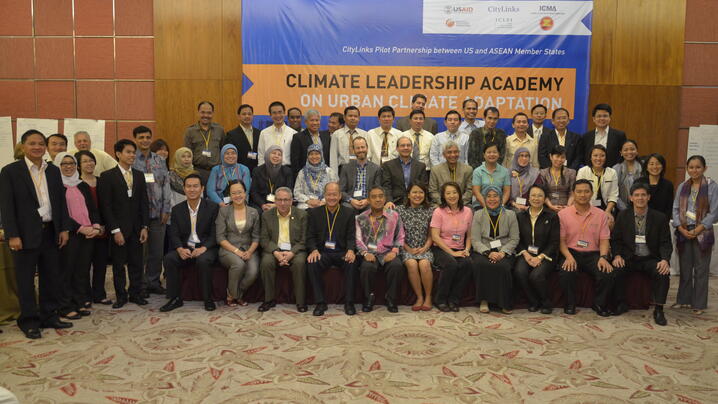
Most settlements in Southeast Asia developed along coastlines and riverbank corridors. These cities are now among the world’s highly vulnerable urban centres facing the challenge of adapting to climate change. It is marked by the anticipated sea level rise, spread of vector borne diseases, changes in cropping systems, strain on water resources, and heightened disaster risks: a scenario that calls for an immediate response from local governments who have the mandate and jurisdiction over their territories and resources.
Made possible by CityLinks, a USAID-funded program of the International City/County Management Association (ICMA), the Climate Leadership Academy on Urban Climate Adaptation was successfully held in Jakarta, Indonesia last August 13-15,2013 drawing local government participants from Chiang Rai (Thailand), Ho Chi Minh (Vietnam), Jakarta (Indonesia), Kuantan (Malaysia), Legazpi (Philippines), Paksane (Laos), Palembang (Indonesia), and Phnom Penh (Cambodia).
US Ambassador to the ASEAN David Carden graced the opening ceremonies with inspiring stories from 3 cities from which he highlighted the need for stakeholders’ engagement, effective communication strategies, and comprehensive urban planning.
In a series of plenary and breakout-sessions facilitated by the Institute for Sustainable Communities (ISC), the city teams focused on accelerating their cities’ efforts in managing the social, political, environmental and financial risks of urban infrastructure. It also served as a unique training and peer-learning opportunity with U.S. counterparts.
Experts from the Center for Resilience at Ohio State University, City of Townsville (Australia), City of Fort Lauderdale (Florida, US), the Institute for Social and Environmental Transition, the International Union for Conservation of Nature, and USAID shared on leveraging resources, planning infrastructure, and establishing regional, national and international collaboration for ecosystem services.
ICLEI-Local Governments for Sustainability, which had been working in the region for more than 15 years, likewise provided technical and logistical support.
In the team huddles, each city identified their priority sectors for climate change adaptation. Although diverse in culture, language, political organization, population density and geographical features, the ASEAN cities learned best practices from each other particularly on disaster risk reduction, coastal zone management, and linkaging.
The Climate Leadership Academy’s tangible outputs include not only capacity-building for the participants but moreso the Specific Actions that each city committed to upon their return to their home countries. Common to all of them is the emphasis on policy-making, creating institutional arrangements, and mobilizing resources.
Amidst competing priorities that are typical in developing nations, it is cause-worthy that local governments in Southeast Asia are vanguards of climate change adaptation.
New, Reduced Membership Dues
A new, reduced dues rate is available for CAOs/ACAOs, along with additional discounts for those in smaller communities, has been implemented. Learn more and be sure to join or renew today!
